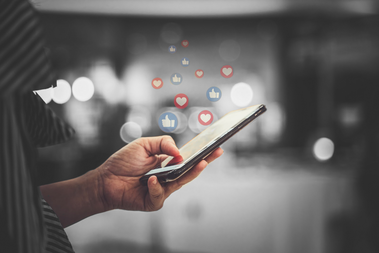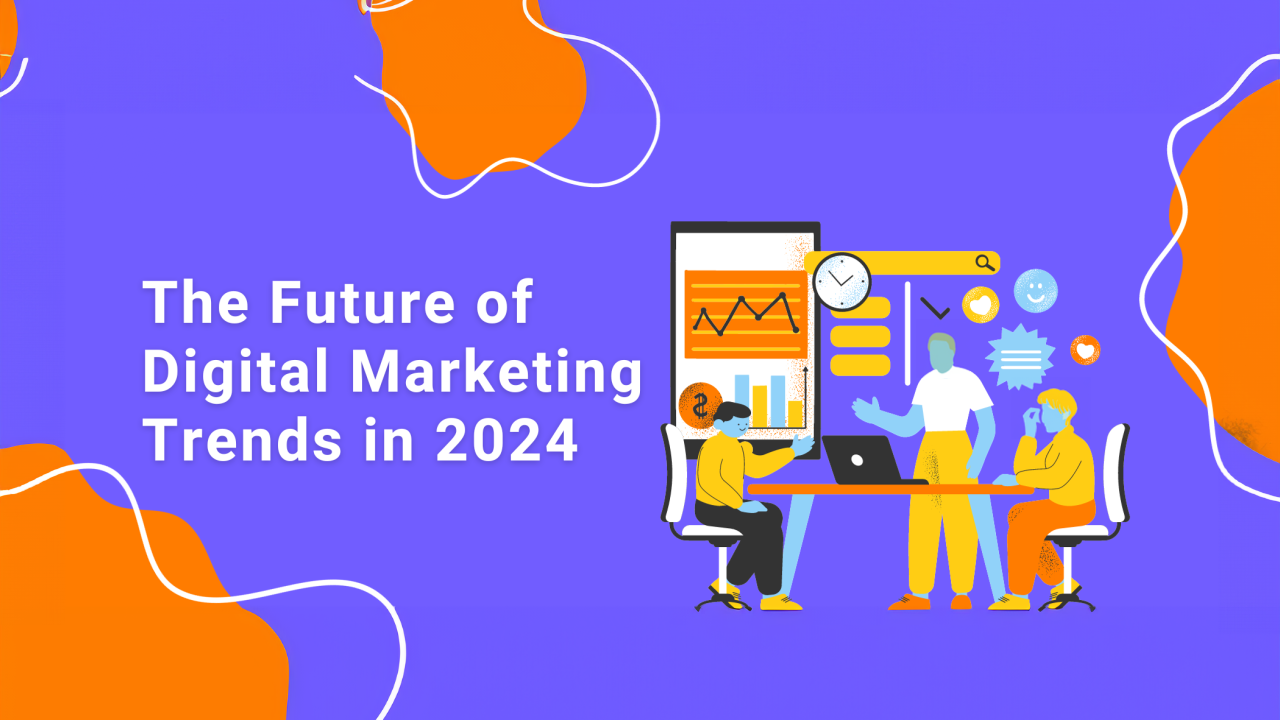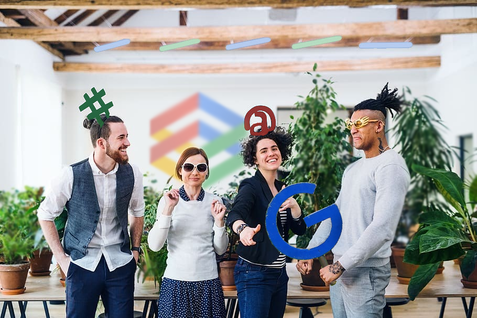What Does a Marketing Solutions Company Do?In today's fast-paced and highly competitive business landscape, effective marketing is crucial for success. Companies, big and small, need to connect with their target audience, build their brand, and drive revenue. This is where marketing solutions companies come into play. But what exactly do they do? In this blog, we'll delve into the world of marketing solutions and explore the multifaceted role of these companies. Defining a Marketing Solutions Company: A marketing solutions company, often referred to as a marketing agency or firm, is a specialized service provider that assists businesses in planning, executing, and managing their marketing efforts. These firms are staffed with experts in various aspects of marketing, from strategy and advertising to data analytics and digital marketing. Their primary goal is to help their clients achieve their marketing objectives efficiently and effectively. Comprehensive Marketing Strategies:One of the core functions of a marketing solutions company is to help businesses develop comprehensive marketing strategies. This involves understanding the client's goals, target audience, and competitive landscape. By conducting market research and competitor analysis, marketing solutions companies can identify opportunities and challenges, enabling them to create a tailored marketing plan. Brand Development and Management: Building and maintaining a strong brand is essential for long-term success. Marketing solutions companies work on defining, refining, and promoting a brand's identity. They design logos, create brand guidelines, and develop strategies for brand consistency across various channels. This ensures that the brand's image remains cohesive and memorable. Advertising and Promotion: Marketing solutions companies excel in creating and executing advertising campaigns. Whether it's through traditional media like TV and print or digital channels like social media and online advertising, they help clients reach their target audience effectively. They design eye-catching advertisements, select the right platforms, and manage media buying to maximize the campaign's impact. Digital Marketing:In the age of the internet, digital marketing is a fundamental aspect of a marketing strategy. Marketing solutions companies specialize in online marketing channels, including social media marketing, content marketing, search engine optimization (SEO), and pay-per-click advertising (PPC). They keep up with the latest trends and technologies to ensure their clients are at the forefront of the digital landscape. Content Creation and Management: Content is king in the digital marketing realm. Marketing solutions companies often provide content creation services, including blog posts, videos, infographics, and more. They understand how to create engaging and relevant content that appeals to the target audience, ultimately driving traffic and conversions. Data Analytics and Performance Tracking: Measuring the success of marketing efforts is critical for continuous improvement. Marketing solutions companies use data analytics to track key performance indicators (KPIs) and provide clients with insights into the effectiveness of their marketing campaigns. They adjust strategies based on data, ensuring a return on investment and ongoing success. Customer Engagement and Relationship Management: Effective customer engagement is crucial for long-term success. Marketing solutions companies work on strategies to engage with customers through email marketing, social media, and customer relationship management (CRM) systems. They help businesses nurture and retain their customer base. Final Thought:In a rapidly evolving business landscape, marketing solutions companies play a pivotal role in helping businesses thrive. Their services encompass everything from strategic planning and brand development to advertising, digital marketing, and data analytics. By entrusting their marketing needs to these experts, businesses can focus on what they do best, confident in the knowledge that their marketing is in capable hands. Whether it's a startup seeking to establish its brand or a well-established corporation aiming to stay competitive, a marketing solutions company can be the key to achieving and surpassing their marketing goals.
Geographic targeting is important for several reasons, particularly in the context of marketing, advertising, and business strategies. Here are some of the key reasons why geographic targeting is important:
As we step into the new year, the marketing landscape is set for a transformative journey, embracing innovative strategies and cutting-edge technologies. The year 2024 promises to be an exciting time for marketers, with trends that redefine the way businesses connect with their audiences. In this blog post, we'll explore the top marketing trends that are expected to shape the industry in 2024.
The marketing industry is always evolving, and it's important for businesses to stay ahead of the curve in order to remain competitive. With that in mind, here are some marketing trends to keep an eye on in 2024.
The holiday season is a crucial time for businesses, and with Christmas just around the corner, it's important for marketers to be aware of the latest trends and strategies for the festive season. As we head into the 2023 Christmas season, here are some of the top Christmas marketing trends that businesses should consider incorporating into their holiday marketing efforts.
Marketing Signals Signal-based marketing is a type of marketing that uses signals, or data points, to make informed decisions about marketing strategies and tactics. This approach to marketing uses data and insights to identify the most effective marketing strategies and to continuously optimize campaigns based on performance. Signal-based marketing typically involves collecting data on a variety of aspects of a marketing campaign, such as audience behavior, engagement, conversion rates, and more. This data is then analyzed to identify patterns and trends, which can inform decisions about marketing strategies and tactics. Some common signals used in signal-based marketing include website analytics data, customer behavior data, social media data, and email marketing data. By using these signals, marketers can make informed decisions about which marketing channels to use, what type of content to create, and how to target their audience. Signal-based marketing is a data-driven approach to marketing that uses signals to inform decisions about marketing strategies and tactics. By using data and insights to optimize campaigns, signal-based marketing helps marketers to make informed decisions and improve the performance of their marketing efforts. Anticipation Marketing Signals, The Next FrontierAnticipation marketing signals are changing marketing by providing marketers with valuable insights into consumer behavior and buying patterns. By using these signals, marketers can better understand their audience and create marketing strategies that are more effective and efficient.
Some of the ways that anticipation marketing signals are changing marketing include:
Are you intrigued by the potential of social media for your business but find it overwhelming to manage alongside your myriad responsibilities as a business owner? If so, you're not alone.
This webinar is tailored to you if: You're uncertain about your social media marketing strategies and their effectiveness. Your approach to social media involves posting content and hoping for likes, without significant results. You recognize that your current social media strategy isn't yielding the desired outcomes for your business. With increased competition and a saturated social media landscape, marketing your business requires a fresh approach. Social media is vital for attracting clients, and it can be both fun and effective. Whether you're new to social media marketing or seeking to refine your strategy, this webinar has you covered. This Webinar will equip you to outshine your competition. During this webinar, you will learn to:
Download your audit guide below:  The creator economy refers to the growing trend of individuals using digital platforms to create and monetize content, such as video, music, writing, art, and more. In the creator economy, individuals can build an audience and monetize their content through a variety of means, including advertising, sponsorships, merchandise sales, and more. The creator economy has been enabled by the widespread adoption of the internet and digital technologies, which have made it easier for individuals to create and distribute content, as well as to connect with audiences and monetize their content. This has led to a democratization of content creation, as more individuals have the ability to create and share their work with a global audience. Some of the key players in the creator economy include social media platforms, such as YouTube, TikTok, and Instagram, as well as marketplace platforms, such as Patreon and Substack, which connect creators with audiences and provide monetization opportunities. The creator economy refers to the growing trend of individuals using digital platforms to create, monetize content, and is enabled by the widespread adoption of the internet and digital technologies. This trend has led to a democratization of content creation and the growth of new monetization opportunities for individuals. The creator economy has had a significant impact on the internet and digital media, leading to a number of changes and shifts in the way that content is created, distributed, and monetized. Some of the key ways that the creator economy has changed the internet include:
Balancing your content to offer value and not just sell is important for several reasons:
 Decentralizing social media refers to creating a platform that operates on a decentralized network rather than a centralized server. This means that the platform is not controlled by a single entity or company, but instead is run by a network of users and nodes. The idea behind decentralizing social media is to create a more secure and user-friendly platform that provides users with greater control over their data and privacy. In a decentralized social media platform, users can own control, and create a "super app" that offers a wide range of features and services beyond traditional social media. This can include features such as e-commerce, payment systems, and content creation and distribution. The idea is to create an all-in-one platform that users can access for all their online needs, rather than relying on multiple separate apps and platforms. By decentralizing social media, the aim is to create a platform that is more equitable, secure, and user-centric. However, the implementation of decentralized social media is still in its early stages and there are many challenges to overcome, including issues related to scalability, user adoption, and security. Decentralizing social media has the potential to revolutionize the way people interact online by providing greater control, privacy, and security. The ultimate goal is to create a "super app" that offers a wide range of features and services while being equitable and secure for users. The Benefits of Decentralized Soical NetworkA decentralized social network can offer several benefits over traditional centralized social networks:
How Can You Join The Decentralized Social Network Movement An example of a decentralized social network is Mastodon. Mastodon is a free, open-source, decentralized alternative to traditional centralized social media platforms like Twitter. It operates on a decentralized network, meaning that the platform is not controlled by a single entity or company, but instead is run by a network of users and nodes. Users of Mastodon can create their own instances, or communities, with their own rules and moderation policies. This allows for a diverse range of experiences and perspectives, as well as greater user control over their online experiences. Mastodon also places a strong emphasis on privacy and security, as well as transparency and trust. The platform is designed to allow users to own and control their data, and to provide a transparent record of all transactions and data on the network. Mastodon is a decentralized social network that provides users with greater privacy, security, and control over their online experiences. What Are The Cons of Decentralized Social MediaWhile decentralized social networks have many benefits, there are also some potential drawbacks or challenges to consider:
 Content marketing is a strategy that involves creating and sharing valuable, relevant, and consistent content to attract and retain a clearly defined audience — and, ultimately, to drive profitable customer action. The goal of content marketing is to educate and engage an audience with the purpose of establishing trust and credibility, and ultimately, driving profitable customer action. Content can come in many forms, including blog posts, articles, videos, infographics, and social media posts. Content marketing can help businesses build brand awareness, generate leads, and drive sales. By providing valuable information to customers, businesses can establish themselves as thought leaders in their industry and establish a relationship with their target audience. This can lead to increased customer loyalty and repeat business over time. How Can Businesses Use Content MarketingBusinesses can use content marketing in several ways to achieve their marketing goals:
Google is dedicated to ensuring a safe and reliable online experience for users and businesses. They have a team working tirelessly to establish and enforce effective policies for advertisers and publishers. These policies aim to prevent abuse while supporting the growth of publishers and businesses. Google continuously invests in policy improvements to adapt to the evolving digital landscape.
In 2022, Google introduced or updated 29 policies for advertisers and publishers. They expanded their financial services verification program to 10 new countries and enhanced protections for teenagers. Through their policies and enforcement, Google removed over 5.2 billion ads, restricted over 4.3 billion ads, and suspended more than 6.7 million advertiser accounts. They also took action against over 1.5 billion publisher pages and over 143,000 publisher sites that violated their policies. Google employs a combination of human reviews and automated systems powered by artificial intelligence and machine learning to enforce their policies at such a large scale. Fraud and scams are a growing concern, and Google is committed to combating them. They expanded their financial services certification program, requiring advertisers to demonstrate authorization from local regulators. Google aims to provide an extra layer of security against fraudsters and protect people from financial scams. However, bad actors are becoming more sophisticated, using tactics to evade detection. Google responds swiftly to identify and counter coordinated threats. For example, they recently tackled a campaign of scammers spreading malware by impersonating popular software brands. To combat misinformation and harmful content, Google has implemented policies against false claims, harmful health claims, climate change denial, hate speech, violence, and dangerous products or services. They blocked ads from running on over 300,000 publisher pages that violated these policies and removed millions of policy-violating ads. Google also prioritizes providing reliable information about election ads and expanded their verification and transparency program for election ads. Following the start of the war in Ukraine, Google promptly prohibited ads that exploit, dismiss, or condone the war. They also paused most commercial activities in Russia and implemented policies to block ads related to the war in Ukraine and state-funded media sites. Child safety is a top priority for Google, and they have implemented measures to ensure a safe online environment for kids and teens. They have blocked ads targeting young children and filtered mature ad categories. Google extended these protections to all users under the age of 18 globally, blocking ad targeting based on age, gender, and interests. They also prohibit specific ad categories for people under 18. Google is committed to empowering users with more information and control over their ad experience. They launched My Ad Center, allowing users to control the types of ads they see and limit ads from sensitive categories. Google also verifies advertiser identities and provides information about advertisers through advertiser pages and the Ads Transparency Center. Looking ahead to 2023, Google will continue their efforts to combat abuse across their platforms while supporting advertisers and publishers in growing their businesses.  10 Ways Artificial Intelligence (AI) is significantly transforming the marketing landscape:
 Denver Marketing Solutions (DMS) is a leading digital marketing agency that is committed to the responsible use of Artificial Intelligence (AI). AI has revolutionized the way businesses operate, and it has become an integral part of the marketing industry. However, it is important to ensure that AI is used responsibly to avoid negative consequences. In this blog post, we will explore how DMS uses AI in a responsible manner.
 Artificial intelligence (AI) has become an increasingly prevalent and powerful tool in many fields, from healthcare and education to finance and transportation. While AI can provide a wide range of benefits, it is important to use it responsibly to avoid negative consequences. In this article, we will explore the principles of responsible AI use. First and foremost, responsible AI use requires transparency. Organizations that use AI must be transparent about what data they are using, how they are using it, and what outcomes they are trying to achieve. This transparency allows for better accountability and oversight, as well as helps to build trust between organizations and the public. Secondly, responsible AI use requires fairness. This means ensuring that AI is not used to discriminate against individuals or groups based on their race, gender, age, or any other characteristic. It is crucial to ensure that AI systems are trained on diverse datasets and that they are rigorously tested to identify and eliminate any biases that may exist. Thirdly, responsible AI use requires privacy. Organizations must ensure that individuals’ data is being used ethically and that it is being protected from unauthorized access or misuse. It is important to implement strong security measures to prevent data breaches, as well as provide individuals with clear information about how their data is being used and the option to opt out of data collection. Fourthly, responsible AI use requires accountability. Organizations must take responsibility for the actions of their AI systems and be willing to address any negative consequences that may arise. This includes being willing to identify and correct errors, as well as ensuring that individuals can appeal decisions made by AI systems. Rresponsible AI use requires human oversight. While AI can automate many tasks and processes, it is important to remember that it is not infallible. Human oversight is necessary to ensure that AI systems are operating as intended and to identify any unintended consequences or errors. Responsible AI use requires transparency, fairness, privacy, accountability, and human oversight. By following these principles, organizations can ensure that AI is used ethically and responsibly and that it provides benefits to society without causing harm. As AI continues to evolve and become more powerful, we must use it responsibly and for the greater good. |
Telephone |
Services |
HoursM-F: 6am - 6pm MST
|
Address1801 Broadway, 5th Floor
Denver, CO 80202 |
© 2024 Denver Marketing Solutions, LLC
Privacy Policy | Terms of Use | Data Opt Out | Request Your Information
Privacy Policy | Terms of Use | Data Opt Out | Request Your Information









 RSS Feed
RSS Feed

